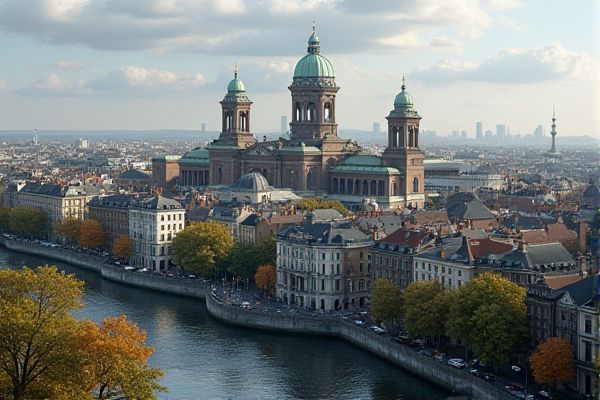
Housing market and best cities to live in Germany: Housing market trends. Property prices. Cost of living. Rent control policies. Property taxes. Best cities for expats. Public transportation access. Safety and crime rates. Job market potential. Quality of life indicators.
Housing market trends
The German housing market in 2024 is marked by significant demand juxtaposed against a reduced supply from new construction activity, fostering stable rental income, particularly in high-demand areas. Despite challenges such as high financing costs and low construction activity, there are notable investment opportunities. Housing prices are anticipated to stabilize, with some cities experiencing slight declines while others, such as Berlin and Munich, maintain stability. Forecasts suggest a rise in purchase prices beginning in 2025, along with notable rental growth in key cities like Munich and Dusseldorf. For a comprehensive analysis, the German Real Estate Market Insights 2024 Mid-Year Review provides in-depth insights, guiding investors through this evolving market landscape.
Property prices
In the first quarter of 2024, residential property prices in Germany experienced a significant drop of 5.7% year-on-year, with the most considerable declines observed in single and two-family homes in major cities at 9.5%, and apartments in these urban areas decreased by 4.6%. This downturn is primarily attributed to higher interest rates which have effectively cooled the housing market. For a detailed analysis, you can explore more about it on German House And Apartment Prices Drop.
Cost of living
The most expensive regions in Germany for living costs are the south, particularly Munich and Stuttgart, followed by cities like Frankfurt and Hamburg. However, cities like Aachen, Paderborn, and Dresden offer more affordable living options, with Berlin remaining relatively cheaper compared to other European capitals. For more detailed information, you can visit the Cost of Living in Germany page.
Rent control policies
Germany's Mietpreisbremse (rent brake) policy, introduced in 2015, caps rent hikes at 10% above the local comparative rent in tight housing markets, aiming to protect tenants from runaway rent increases. However, its effectiveness is hindered by a lack of increased housing construction. As explored in [Rental Brake: Boon or Bane for German Housing Market](https://www.refire-online.com/markets/rental-brake-boon-or-bane-for-german-housing-market/), this policy remains a point of contention among policymakers and housing experts, with debates centered on its impact on affordability and availability of housing. Despite its intentions, the policy's impact is limited without addressing the fundamental issue of insufficient housing supply.
Property taxes
Property taxes in Germany, known as "Grundsteuer" or local property tax, vary by location and property type, with rates ranging from 0.26% to 1% of the assessed property value, which is typically lower than the market value. Additionally, a one-time property transfer tax, known as "Grunderwerbsteuer," is levied at rates of 3.5% to 6.5% of the purchase price, depending on the federal state where the property is located. For more detailed information, you can visit the PTI Returns website, which provides an extensive overview of property taxes and rental income taxes in Germany.
Best cities for expats
The best cities for expats in Germany include Berlin, Dusseldorf, Frankfurt, Hamburg, Munich, Nuremberg, and Stuttgart, each offering high quality of life, excellent infrastructure, and diverse cultural experiences. These cities rank highly in global quality of life surveys, with Frankfurt, Munich, and Dusseldorf among the top 10 globally.
Public transportation access
In Germany, cities like Berlin and Stuttgart stand out for their fast public transportation, making them ideal for expats who value efficient commuting. Other cities such as Frankfurt and Munich also offer well-connected and efficient public transport systems, including buses, trams, U-Bahn, and S-Bahn trains, enhancing the quality of life for residents. For more detailed information on which German cities have the fastest and slowest public transport, you can explore the article on the IAmExpat website, where extensive insights into the speed and connectivity of these systems are provided.
Safety and crime rates
Germany is generally a very safe country to live in, characterized by low crime rates and effective law enforcement. Cities like Munich, Nuremberg, and Stuttgart are particularly safe, reflecting the nation's dedication to maintaining public order. While larger cities, including Berlin, Hamburg, and Frankfurt, may have higher crime rates, they still uphold a strong overall safety record, ensuring the residents' peace of mind. For more detailed insights on Germany's safety standards, consider visiting the Kummuni website.
Job market potential
Germany boasts several cities renowned for their job market potential and exceptional quality of life. Munich leads the way, celebrated for its thriving tech, finance, and automotive sectors. Likewise, Frankfurt stands as the financial capital, excelling in both finance and media industries. Berlin, a dynamic hub for start-ups and innovation, offers numerous opportunities for entrepreneurs. In Hamburg, prospects abound in logistics, trade, and renewable energy. Stuttgart is notable for its prominence in the automotive and aerospace industries. These cities are recognized for providing high average salaries, diverse job opportunities, and a vibrant quality of life. For more detailed insights, you can explore the information provided by Halian on the best cities for work in Germany.
Quality of life indicators
In Germany, cities like Frankfurt, Stuttgart, and Munich top the Quality of Life rankings, offering high scores in indices such as purchasing power, safety, healthcare, and a relatively low cost of living. Despite the current decline in housing prices due to higher interest rates and construction costs, these cities maintain their prestigious status. For more information, you can explore the Quality of Life rankings on the Numbeo website.
